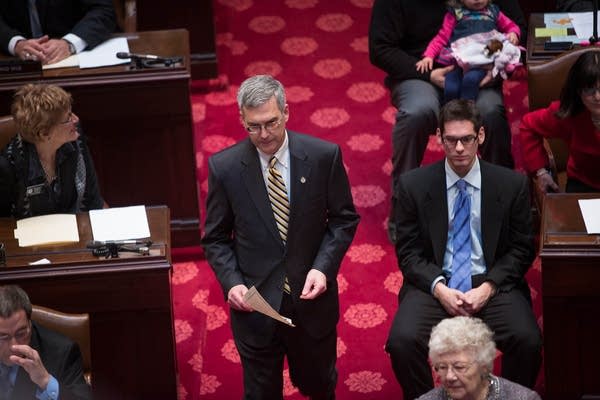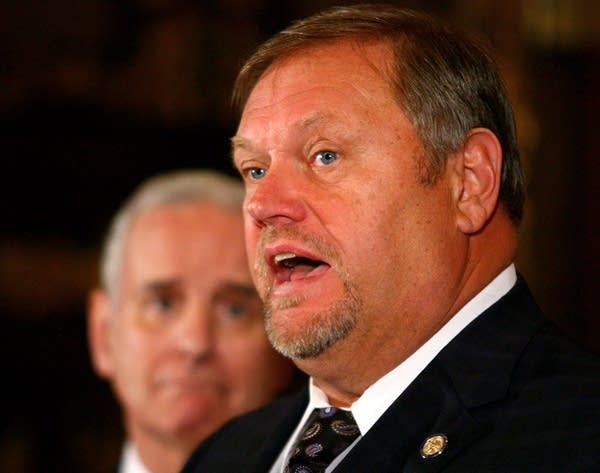Legislative pay raise passes narrowly, but easily
Go Deeper.
Create an account or log in to save stories.
Like this?
Thanks for liking this story! We have added it to a list of your favorite stories.

A bill that narrowly passed the Minnesota Senate Tuesday funds state government agencies but also includes pay raises for legislators, the governor and other top officials beginning in 2015.
It was a close vote, 34 to 32. Most lawmakers agree that those salaries are too low, but many aren't willing to support an increase.
Senate Republicans raised several concerns about the omnibus state government, veterans and military affairs budget bill. They objected to the elimination of a commission to end outmoded government agencies, a new auto theft prevention surcharge on insurance policies and an allocation for a Forest History Center.
But there were no complaints about the pay raises, or any amendments to try to strike or adjust them. There was no discussion at all.
Turn Up Your Support
MPR News helps you turn down the noise and build shared understanding. Turn up your support for this public resource and keep trusted journalism accessible to all.
After the vote, Senate Republican Minority Leader David Hann of Eden Prairie was asked if legislators deserve a raise.
"I think it depends on who you talk to. I mean a lot of legislators understand when they're elected what they get paid," Hann said. "I think the timing is a little difficult when people contemplate the kind of economy that we're in and circumstances people are going through. It's difficult. But most of the people I know don't think we're overpaid."
Hann added that he would take the higher salary if it becomes law.
Democrats also did not address the pay raise during the floor session, even though the recommendations came from a nonpartisan panel that studied government salaries, many of which have been static for 15 years.

Under the bill, the governor's $120,000 salary would increase by 3 percent. Legislators' salaries would then be set at 33 percent of the governor's salary, which would increase annually based on inflation. Members of the House and Senate would initially see their base pay go from about $31,000 to about $41,000. Current restrictions on the salaries of top agency officials would also be loosened. None of the changes could take effect until after the next election.
DFL Senate Majority leader Tom Bakk of Cook said he was a little disappointed that there wasn't a bipartisan vote for the bill, because some Republicans had told him privately that they agreed with the raises. Bakk said voting for a pay raise is never easy. He said the 34 Senators who did, showed great leadership for the institution.
"This is not at all about somebody like me that's been around here for 20 years. This is about the next generation of people that come to the Senate and what kind of people we're going to be able to recruit," Bakk said. "Or is the future of the institution of the Senate going to be one where only retirees can come here to serve or maybe only people that are exceptionally wealthy can come here to serve?
"Or worse yet, maybe only people that will be here someday are people that can find a job anywhere else."
With the essential 34 votes in hand, Bakk said he was unconcerned that five recently-elected DFL senators from swing districts voted against the state government finance bill. One of the Democrats, Sen. Greg Clausen of Apple Valley, said his vote was all about the pay raise.

"As a newly-elected senator, I just didn't feel comfortable at this time that I should be voting for a pay raise for myself," Clausen said. "As a public employee over the years, I've taken pay cuts many times as an educator. And at this point in time coming out of a recession, looking at being a first-term senator, I just didn't think it was appropriate."
The House did not include pay raises in its state government budget bill. But Bakk said the Senate plans to fight hard for its position in conference committee negotiations.
DFL Gov. Mark Dayton supports the raises and said he believes legislators are terribly underpaid. He also knows firsthand the challenges posed by the current salary restrictions in hiring commissioners. But he said that if a raise comes his way while in office, he would donate the money to charity.





